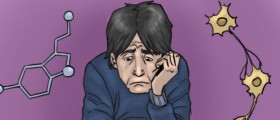
One person’s biology can increase chances for developing depression. Four factors are responsible for this kind of vulnerability and they are: genetic factors, biochemical factors, alterations in hormonal regulation and sleep abnormalities.
Genetic Factors
Researches that were performed on identical twins showed that there is a great genetic influence in development of depression. If one twin has depression or different kind of mood disorder, than the other twin has 45% to 60% chances for developing that disorder, too. Hereditary factors determine only vulnerability to this illness, but some other factors, like stress or something similar, must be present so that, a person could develop a depressive disorder.
Biochemical Factors
We have a great number of neurons in our brain and between those neurons is a synaptic space. In that synaptic space are substances called neurotransmitters. Changes in the amount of neurotransmitters can cause depressive disorders and these changes can be provoked by genetics, stress, hypothyroidism, AIDS and excessive use of drugs. There are various types of neurotransmitters and those that are responsible for depression are serotonin and norepinephrine. Other neurotransmitters that can influence on development of depression are acetylcholine, dopamine and others.
Alterations in Hormonal Regulation
Changes in the amount of some hormones can also be the cause of depressive disorder. High level of adrenal-cortex hormone called cortisol is associated with depression. Also there are some other proves that the excessive activity of a certain cortical axis is responsible for depression. This kind of unusual activity can be found in individuals suffering from OCD and some other psychiatric conditions.
Sleep Abnormalities
In depressive patients, sleep abnormalities are mostly present during the depressive episode. These abnormalities can be seen on EEG. These patients have slower delta waves than usual, and there are changes in the REM phase. Patients who don’t have these changes in the REM phase are usually not responding to tricyclic antidepressant drugs, because they inhibit early occurrence of REM phase during sleep.
The chemical changes in our body can induce depressive disorders and fortunately these are treatable with specific medications such as antidepressants and others. However, there are a lot of facts that we don’t know anything or very little about. For instance, we have no explanation on how chemistry of our body can have such great effect on our emotions. There are many other unrevealed facts about this problem and that is the field that has to be investigated. We hope that this article will be an inspiration for someone to try to explore this enigmatic field.
















-Signs,-Symptoms,-Treatment-And-Prevention_f_280x120.jpg)
Your thoughts on this
Loading...